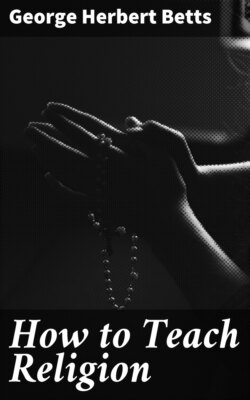Читать книгу How to Teach Religion - George Herbert Betts - Страница 6
На сайте Литреса книга снята с продажи.
THE TEACHER HIMSELF
ОглавлениеTable of Contents
It is easy enough to secure buildings and classrooms for our schools. The expenditure of so many dollars will bring us the equipment we require. Books and materials may be had almost for the asking. The great problem is to secure teachers—real teachers, teachers of power and devotion who are able to leave their impress on young lives. Without such teachers all the rest is but as sounding brass or a tinkling cymbal. And to be a real teacher is a very high achievement.
Bishop Vincent was giving a lecture on "That Boy." He himself was "that boy," and in the course of describing his school days he fell into meditation as follows: "That old school master of mine!—He is dead now—and I have forgiven him!—And I am afraid that was the chronology of the matter; for I never was able to forgive him while he lived." I, as one of the listeners, smiled at the bitter wit of the speaker, but was oppressed.
This somber view of the impression sometimes left by teachers on their pupils received an antidote the following day, however, when a venerable old man approached my desk bearing in his hands an ancient and dog-eared copy of a text in grammar. He opened the book and proudly showed me written across the fly leaf "Grover Cleveland, President." Then he told me this story:
"I have been a teacher. In one of my first schools I had Grover Cleveland as a pupil. He came without a textbook in grammar, and I loaned him mine. Years passed, and Grover Cleveland was President of the United States. One day I was one of many hundreds passing in line at a public reception to grasp the President's hand. I carried this book with me, and when it came my turn to meet the President, I presented the volume and said, 'Mr. President, do you recognize this book, and do you remember me?' In an instant the light of recognition had flashed in Mr. Cleveland's eyes. Calling me by name, he grasped my hand and held it while the crowd waited and while he recalled old times and thanked me for what I had meant to him when I was his teacher. Then he took the old book and autographed it for me."
Three types of teachers.—Two types of teachers are remembered: one to be forgiven after years have softened the antagonisms and resentments; the other to be thought of with honor and gratitude as long as memory lasts. Between these two is a third and a larger group: those who are forgotten, because they failed to stamp a lasting impression on their pupils. This group represents the mediocrity of the profession, not bad enough to be actively forgiven, not good enough to claim a place in gratitude and remembrance.
To which type would we belong? To which type can we belong? Can we choose? What are the factors that go to determine the place we shall occupy in the scale of teachers?
